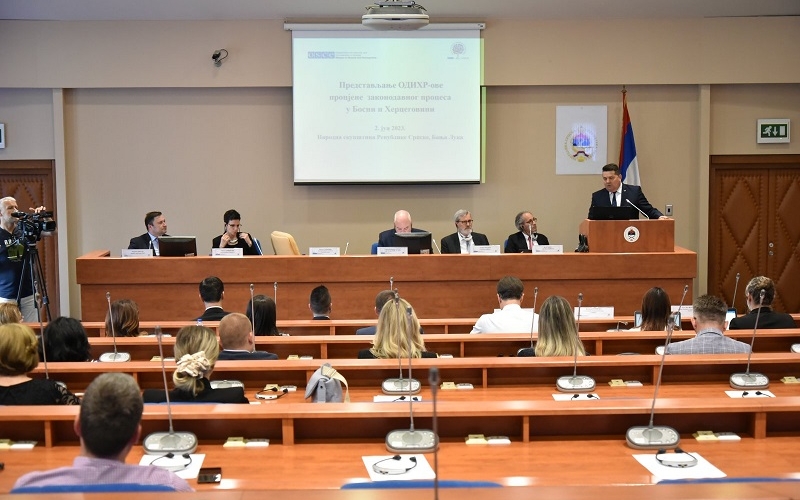The Evaluation of the Legislative Process in BiH presented in the National Assembly
The President of the National Assembly of the Republic of Srpska Dr Nenad Stevandic said addressing the present audience today at the OSCE presentation, that the National Assembly of the Republic of Srpska is a democratic parliament open for cooperation but that it is maintains its constitutional order, dignity, and the right to make its own decisions.
"The National Assembly of the Republic of Srpska is a democratic institution where everything is discussed freely, which organizes professional conferences, which communicates with the offices of the EU and the OSCE, as well as with other international organizations, as well as with almost all embassies, and it is difficult to find objections to our transparency. "Not only in this, but also in the previous mandates, the National Assembly represents a real example of cooperation," said Stevandic.
He stressed that on all occasions, the National Assembly of the Republic of Srpska strives to keep its constitutional capacity and dignity and preserves the right to make its own decisions.
“On this occasion, we sincerely want to thank the OSCE for its cooperation and recommendations. The National Assembly keeps the right to make decisions on this issue, that is what to accept and what not, and where to make changes. And on this occasion, it is necessary to stress various things that are important, such that the Republic of Srpska does not accept tutorials and the imposition of the law, to lead the policy led by the Venetian Commission and not the OHR Office, said Stevandic in the addressing speech”.
He stressed that the dialog and the agreement of the two entities represent the vital principle of the Dayton peace agreement and that those principles are not valid only in the OHR office and the Constitutional Court of BiH where the decisions are being made by two foreigners who are the creators of the crises as well.
“The attitude of the National Assembly is that we need to talk and that important questions should be agreed between entities and peoples, and that the cooperation with all international institutions is welcome which makes critics, if they make them, with a good purpose. Every critic with the aim to help is welcome and we will assess what we can apply, and to preserve dignity and the constitutional position of the Assembly and the position of the Serbian people”, said President Stevandic.
Ambassador Brian Aggeler said that this evaluation of the legislative procedure in BiH has been the result of hard work and thanked all that participated in the process.
He pointed out that the parliamentary committees have a big role in the legislative process and expressed the hope that the mentioned recommendations will help in their work, but also in improving the perception of citizens.
Chief of the ODIHR Office for legislative support, said that the recommendations are the result of several years of expert work, and that the aim is to practically improve the legislative process in the entire BiH.
“Main deficiencies in the process of passing a law in BiH are the way rules are being or not implemented, “said the ODIHR expert Lucius Madder, a professor at the university in Lausanne.
ODIHR expert, and the state counselor of France Iv Dutrio, talking about recommendations on constitutional courts, said when it is legally possible, that the Assembly committee, president, member of parliament or the Government should consult the Constitutional Court when there is possible doubt concerning the law. This possibility should be encouraged to increase the constitutionality of the law, respect for relevant laws, the European Court for human rights court practice in order to increase the constitutionality of the law, respect for relevant laws, the court practice of the European Court for human rights, and the requests of the process of European integrations.
When it is about recommendations in the context of EU integrations, Dutrio stressed the importance of harmonization with the EU acquis.
In the crucial recommendations stated by the Evaluation f the Legislative Process, reviewing deadlines and their exact prescription has been advised, questioning of the definition of “urgency”, including citizen organizations in the process of passing the law.
It is also added that parliamentary oversight, like the oversight of the law realization and the activity of the ministry in the sphere of the creation of public policies, could be increased in parliamentary working bodies.
ODIHR has given recommendations concerning first of all relevant practical improvement of the law-making process in BiH.
The presentation was attended by the vice president of the National Assembly Mirsad Duratovic , the Secretary General of the National Assembly Boran Bosancic, employees of the National Assembly, and the Council of Peoples of the Republic of Srpska.


